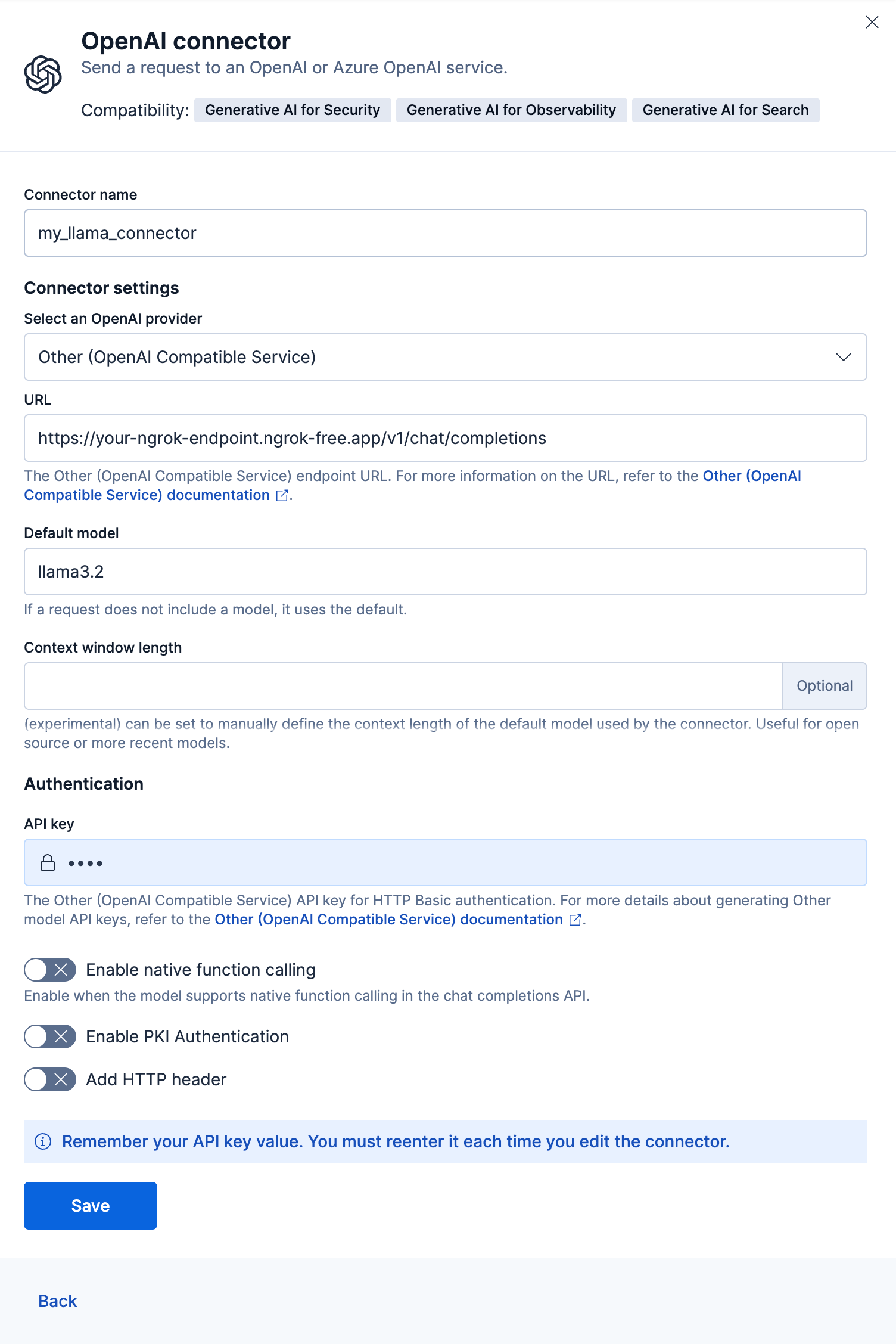Using OpenAI compatible models with the Inference API
Elasticsearch enables you to use LLMs through the inference API, supporting providers such as Amazon Bedrock, Cohere, Google AI, HuggingFace, OpenAI, and more, as a service. It also allows you to use models deployed in your local environment that have an OpenAI compatible API.
This page shows you how to connect local models to Elasticsearch using Ollama.
Ollama enables you to download and run LLM models on your own infrastructure. For a list of available models compatible with Ollama, refer to this page.
Using Ollama ensures that your interactions remain private, as the models run on your infrastructure.
In this tutorial, you learn how to:
- download and run Ollama,
- use ngrok to expose your local web server hosting Ollama over the internet
- connect your local LLM to Playground
- Download Ollama.
- Install Ollama using the downloaded file. Enable the command line tool for Ollama during installation.
- Choose a model from the list of supported LLMs.
This tutorial uses
llama 3.2. - Run the following command:
ollama pull llama3.2
After installation, test the model.
Run
ollama run llama3.2and ask a question, for example, "Are you working?" If the model is installed successfully, you receive a valid response.When the model is running, an API endpoint is enabled by default on port
11434. To test it, make a request to the API using the following command:curl http://localhost:11434/api/generate -d '{ "model": "llama3.2", "prompt": "What is the capital of France?" }'Refer to the API documentation to learn more. The API returns a response similar to this:
{"model":"llama3.2","created_at":"2025-03-26T10:07:05.500614Z","response":"The","done":false} {"model":"llama3.2","created_at":"2025-03-26T10:07:05.519131Z","response":" capital","done":false} {"model":"llama3.2","created_at":"2025-03-26T10:07:05.537432Z","response":" of","done":false} {"model":"llama3.2","created_at":"2025-03-26T10:07:05.556016Z","response":" France","done":false} {"model":"llama3.2","created_at":"2025-03-26T10:07:05.574815Z","response":" is","done":false} {"model":"llama3.2","created_at":"2025-03-26T10:07:05.592967Z","response":" Paris","done":false} {"model":"llama3.2","created_at":"2025-03-26T10:07:05.611558Z","response":".","done":false} {"model":"llama3.2","created_at":"2025-03-26T10:07:05.630715Z","response":"","done":true,"done_reason":"stop","context":[128006,9125,128007,271,38766,1303,33025,2696,25,6790,220,2366,18,271,128009,128006,882,128007,271,3923,374,279,6864,315,9822,30,128009,128006,78191,128007,271,791,6864,315,9822,374,12366,13],"total_duration":2232589542,"load_duration":1052276792,"prompt_eval_count":32,"prompt_eval_duration":1048833625,"eval_count":8,"eval_duration":130808916}
Since the created endpoint only works locally, it cannot be accessed from external services (for example, your Elastic Cloud instance). ngrok enables you to expose a local port with a public URL.
Exposing a local endpoint to the internet can introduce security risks. Anyone with the public URL may be able to send requests to your service. Avoid exposing sensitive data or functionality, and consider using authentication or access restrictions to limit who can interact with the endpoint.
Create an ngrok account and follow the official setup guide.
After installing and configuring the ngrok agent, expose the Ollama port by running:
ngrok http 11434 --host-header="localhost:11434"The command returns a public link that works as long as ngrok and the Ollama server are running locally:
Session Status online Account [email protected] (Plan: Free) Version 3.18.4 Region United States (us) Latency 561ms Web Interface http://127.0.0.1:4040 Forwarding https://your-ngrok-endpoint.ngrok-free.app -> http://localhost:11434 Connections ttl opn rt1 rt5 p50 p90 0 0 0.00 0.00 0.00 0.00Copy the ngrok-generated URL from the
Forwardingline.Test the endpoint again using the new URL:
curl https://your-ngrok-endpoint.ngrok-free.app/api/generate -d '{ "model": "llama3.2", "prompt": "What is the capital of France?" }'The response should be similar to the previous one.
Create a connector using the public URL from ngrok.
- In Kibana, go to Playground from the left navigation menu, and select the button in the Large Language Model (LLM) tile to connect an LLM.
- Select OpenAI on the fly-out.
- Provide a name for the connector.
- Under Connector settings, select Other (OpenAI Compatible Service) as the OpenAI provider.
- Paste the ngrok-generated URL into the URL field and add the
v1/chat/completionsendpoint. For example: https://your-ngrok-endpoint.ngrok-free.app/v1/chat/completions - Specify the default model, for example,
llama3.2. - Provide any random string for the API key (it will not be used for requests).
- Save.

- Click Add data sources and connect your index.
You can now use Playground with the LLM running locally.
You can use your locally installed LLM with the inference API.
Create the inference endpoint for a chat_completion task type with the openai service with the following request:
PUT _inference/chat_completion/llama-completion
{
"service": "openai",
"service_settings": {
"api_key": "ignored",
"model_id": "llama3.2",
"url": "https://your-ngrok-endpoint.ngrok-free.app/v1/chat/completions"
}
}
- The
api_keyparameter is required for theopenaiservice and must be set, but the specific value is not important for the local AI service. - The model name.
- The ngrok-generated URL with the chat completion endpoint (
v1/chat/completions).
Verify if the inference endpoint working correctly:
POST _inference/chat_completion/llama-completion/_stream
{
"model": "llama3.2",
"messages": [
{
"role": "user",
"content": "What is the capital of France?"
}
],
"temperature": 0.7,
"max_completion_tokens": 300
}
The request results in a response similar to this:
event: message
data: {
"id" : "chatcmpl-416",
"choices" : [
{
"delta" : {
"content" : "The",
"role" : "assistant"
},
"index" : 0
}
],
"model" : "llama3.2",
"object" : "chat.completion.chunk"
}
(...)
- Using Ollama with the inference API: A more comprehensive, end-to-end guide to using Ollama with Elasticsearch.